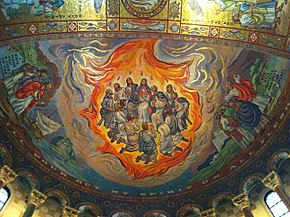Whit week
| Pentecost | |
|---|---|

Mosaic representing Pentecost in the St. Louis Cathedral
|
|
| Also called | Whitsunday |
| Observed by | Roman Catholics, Old Catholics, Protestants, Eastern Orthodox, Oriental Orthodox, Anglicans and other Christians. |
| Type | Christian |
| Significance | Celebrates the descent of the Holy Spirit upon the Apostles and other followers of Jesus |
| Celebrations | Religious (church) services, Festive meals, Processions, Baptism, Confirmation, Ordination, Folk customs, Dancing, Spring & woodland rites, Festive clothing. |
| Observances | Prayer, Vigils, Fasting (pre-festival), Novenas, Retreats, Holy Communion, Litany |
| Date | Easter + 49 days |
| Related to | Shavuot |
The Christian holiday of Pentecost, celebrated on the fiftieth day after Easter, commemorates the descent of the Holy Spirit upon the Apostles and other followers of Jesus Christ while they were in Jerusalem celebrating the Feast of Weeks, as described in the Acts of the Apostles (). Some Christians believe this event represents the birth of the Church, while others maintain that the Church already existed prior to Pentecost.
In Eastern Christianity, Pentecost can also refer to the entire fifty days of Easter through Pentecost inclusive; hence the book containing the liturgical texts for Paschaltide is called the "Pentecostarion". Since its date depends on the date of Easter, Pentecost is a moveable feast.
The holy day is also called "White Sunday" or "Whitsunday", especially in the United Kingdom, where traditionally the next day, Whit Monday, was also a public holiday (now fixed by statute on the last Monday in May). In Germany Pentecost is denominated of "" and often coincides with scholastic holidays and the beginning of many outdoor and springtime activities, such as festivals and organized outdoor activities by youth organizations. The Monday after Pentecost is a legal holiday in many European nations.
The term Pentecost comes from the Greek Πεντηκοστή (Pentēkostē) meaning "fiftieth". It refers to the festival celebrated on the fiftieth day after Passover, also known as the "Feast of Weeks" in the Septuagint and the "Feast of 50 days" in rabbinic tradition.
...
Wikipedia
